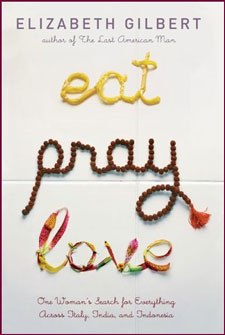"I love my pizza so much, in fact, that I have come to believe in my delirium that my pizza might actually love me, in return. I am having a relationship with this pizza, almost an affair." I laughed out loud when I first read Elizabeth Gilbert's description of her and a friend eating a margherita pizza with double mozzarella in Naples, Italy.
Gilbert's book, Eat.Pray.Love is full of equally endearing stories, conversations and historical background that make her journey of exploring "the art of pleasure in Italy, the art of devotion in India and, in Indonesia, the art of balancing the two" an enjoyable read.
 But there is a seriousness to this book. Gilbert decides to make this year-long spiritual quest when she is left physically and emotionally spent after the long divorce from her husband, that she initiated, and the break-up of a subsequent relationship. Out of respect for her ex-husband, Gilbert declines to comment on his shortcomings but is honest about hers, describing herself as "something like a cross between a golden retriever and a barnacle". It is with equal honestly that she details her depression, and extensive introspection at how she came to be at this place in her life.
But there is a seriousness to this book. Gilbert decides to make this year-long spiritual quest when she is left physically and emotionally spent after the long divorce from her husband, that she initiated, and the break-up of a subsequent relationship. Out of respect for her ex-husband, Gilbert declines to comment on his shortcomings but is honest about hers, describing herself as "something like a cross between a golden retriever and a barnacle". It is with equal honestly that she details her depression, and extensive introspection at how she came to be at this place in her life.
As addictive as it is to be drawn into all these revealed intimacies, a Christian reader of this book needs to remain objective when Gilbert discusses her thoughts on God. In fact, the word "God' is one she chose because it is "proper" and personal enough for her to describe what she regards as indescribable. Although she says she was born a Protestant, she won't call herself a Christian because she cannot "swallow" that "Christ is the only path to God". Instead, she realises she wants a spiritual teacher and decides to follow the practices of a female Guru, ultimately travelling to her Ashram in India.
What follows is a fascinating account of Gilbert's emotions, thought processes and actions as she attempts to master meditation, intermingled with facts on the background of Yoga and her ideas on the human condition. But this section is also riddled with spiritual practices that are not biblical. It's particularly disconcerting to read the chapter on the practice of seeking union with God, where she completely misrepresents the Holy Spirit by saying that it is the energy source through which Christians achieve that state of being.
During one of her meditation sessions she says that she herself achieved "that moment in which the soul excuses itself from time and place and merges with the infinite" Simply put, I got pulled through the wormhole of the Absolute, and in that rush I suddenly understood the workings of the universe completely" I was just part of God. In addition to being God".
Adam and Eve desired to know the workings of the universe completely and by disobeying God they lost their perfect relationship with God. Our God. The God. The same God who destroyed the Tower of Babel and scattered the people as they tried to be like God.
Gilbert's entire book is about her efforts and hers alone, to achieve happiness or if she can, constant bliss. But that's not what the God of the Bible and the universe promises. He promises us Jesus who said "Come to me, all you who are weary and burdened, and I will give you rest" (Matthew 11:28).
This book is so influential that the second time I saw Gilbert appear on the television show Oprah, there was a woman in the audience who, after reading this book, actually travelled to Bali to see the same medicine man that the author had. Gilbert has been praised for taking her happiness into her own hands and finding it in a way that works for her. She herself says that "I think you have every right to cherry-pick when it comes to moving your spirit and finding peace in God." She also says that prayer is talking to God and meditation is listening. If she had read the Bible, she would know that is in reading the Bible that we listen to God and that this is where the soul finds rest. But in our times, that story doesn’t sell as well as hers.























